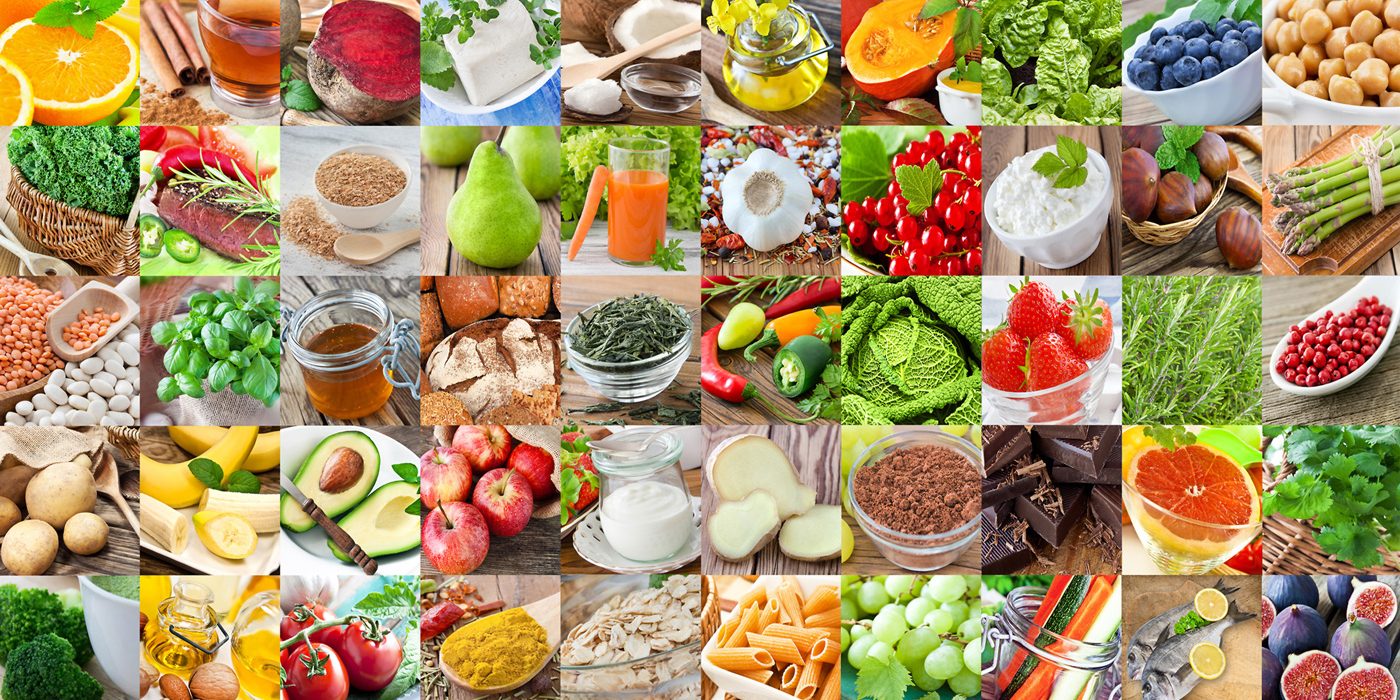
65 of the Healthiest Foods on the Planet
Originally posted on https://www.nutritionalcleanse.com/65-healthiest-foods-on-the-planet/
When it comes to fueling your body, you cannot beat whole, unprocessed foods. Here, we’ll take a look at 65 of the healthiest foods on the planet.
Many of the foods featured on our list require zero preparation, making them an excellent, convenient way to enrich your diet. With all these choices, you’ll be sure to find some new inspiration.
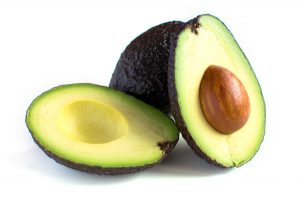 1. Avocados
1. Avocados
Most people do not realize that avocados are actually a fruit. Unlike most fruits, however, they are packed with healthy fats instead of carbohydrates and sugar.
They are a great source of Vitamins C, E, K, and B6, as well as niacin, riboflavin, folate, potassium, pantothenic acid, and magnesium. They also boast Omega 3 fatty acids, lutein, and beta-carotene. Their rich, creamy texture is perfect for making meals taste indulgent.
2. Apples
Apples are packed with fiber, Vitamin C, antioxidants, and numerous vitamins and minerals. They make a perfect grab and go snack if you get hungry in between meals.
Their high content of fiber also makes them immensely satisfying. They also contain potassium and Vitamin C.
3. Bananas
Along with being one of the planet’s best sources of potassium, bananas are also rich in fiber and Vitamin B6. They are also perfectly portable and a great snack to bring on a trip, to work, or in your car.
 4. Blueberries
4. Blueberries
Along with being sweet, delicious, and versatile, blueberries are loaded with fiber, Vitamin C, and potent antioxidants. In fact, blueberries are thought to have one of the top sources of antioxidant levels among all common vegetables and fruits.
The main antioxidant compounds found in blueberries are flavonoids. One group of flavonoids — anthocyanins — is particularly powerful and thought to be the main source of blueberries health effects.
5. Oranges
Oranges are notorious for their high content of Vitamin C. They also contain high levels of antioxidants and fiber, all tucked neatly inside the peel and ready to grab-and-go or toss into your lunch box.
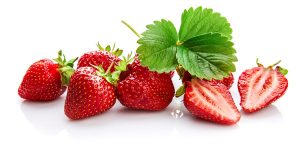 6. Strawberries
6. Strawberries
Strawberries are extremely nutritious, low in carbs, and low in calories.
They are full of Vitamin C – a vitamin essential for healthy collagen production, manganese, fiber, antioxidants, and are delicious eaten plain or added to smoothies or salads.
7. Cherries
Cherries are a good source of fiber, Vitamin A, folic acid, potassium, and calcium. They are notorious for the potent antioxidants they contain.
These antioxidants are believed to be helpful in reducing inflammation, a process that can damage our cells. Specifically, cherries contain the antioxidants anthocyanins and cyanidin.
8. Lemons
Lemons are high in fiber and Vitamin C (one lemon provides about half of the recommended dietary intake of Vitamin C).
Lemons also contain a wide range of plant compounds including hesperidin and diosmin, compounds associated with lowering cholesterol.
Lemons make an excellent addition to salad dressings or an easy way to perk up your water. Many people enjoy starting their day with a warm mug of water with fresh-squeezed lemon juice.
 9. Pineapple
9. Pineapple
Pineapples contain high amounts of fiber, thiamin (a B vitamin involved in energy production), bromelain (an enzyme), Vitamin C and manganese. Better yet, they are fat-free, low in sodium, and cholesterol-free.
Their rich content of vitamins, antioxidants, and enzymes are believed to help support a healthy immune system and strong bones.
At only 74 calories a cup, their delicious flavor makes them perfect for a healthy indulgence if you are craving something sweet.
10. Kiwis
Kiwis are jam-packed with folate, fiber, Vitamin K, and Vitamin C. In fact, just one kiwi provides you with more than the recommended intake of Vitamin C for the entire day!
They also offer a variety of minerals and nutrients such as magnesium, potassium, phosphorus, copper, iron, calcium, and manganese.
Despite their sweet taste, they only contain 7 grams of sugar per medium kiwi, making them an ideal solution if you need something sweet yet still healthy.
11. Pears
Pears are a mild, sweet fruit with a high content of fiber, antioxidants, and flavonoids. They are also free of fat and cholesterol and contain just 100 calories.
They make a great grab-and-go snack if you lead a busy lifestyle or travel.
 12. Eggs
12. Eggs
Despite previously being labeled as unhealthy due to their cholesterol content, studies now show that eggs — yolks and all — provide a host of health benefits.
With choline, Vitamin D3 (one of the few food sources that actually provide this), high-quality protein, healthy fats, and Omega 3s (especially if you get free-range, organic eggs), eggs are brimming with nutrients.
13. Lean Beef
Lean beef, particularly grass-fed, is one of the best sources of protein. It is also packed with bioavailable iron, a mineral needed for numerous vital functions in the body.
14. Chicken Breasts
Chicken breast is high in protein while being low in calories and fat. It is also an excellent source of a variety of nutrients.
Its low carb content makes it an excellent addition to anyone following a low carb diet.
15. Lamb
Since lambs are typically grass-fed, their meat is usually high in Omega-3 fatty acids.
In addition to being required by the body to function, these fatty acids also deliver a wide range of health benefits. Lamb is also an excellent source of high-quality protein.
 16. Almonds
16. Almonds
Almonds are loaded with magnesium, vitamin E, fiber, and antioxidants. Studies show that almonds can provide significant metabolic benefits, making them a top food to add to your diet if you are trying to lose weight.
17. Chia Seeds
Chia seeds — often referred to as a superfood — are among the most nutrient-dense foods around. Just a single ounce boasts high-quality protein, 11 grams of fiber, and a good source of calcium, manganese, magnesium, and several other nutrients.
18. Coconuts
Coconuts are packed with fiber and medium-chain triglycerides, powerful fatty acids that help keep you energized and satisfied. They also have become popular recently for their delicious, hydrating coconut water content.
19. Macadamia Nuts
Macadamia nuts are very tasty. They are much higher in monounsaturated fats, and lower in Omega-6 fatty acids, than most other nuts.
 20. Walnuts
20. Walnuts
Walnuts are loaded with healthy fat, vitamins, minerals, and fiber. They are great eaten alone or as part of a healthy trail mix or sprinkled over a salad.
21. Peanuts
While they are technically a legume, not a nut as their name suggests, peanuts are high in antioxidants, nutrients, and good fat. Numerous studies show that peanuts may be helpful if you are trying to lose weight.
22. Asparagus
Asparagus is low in calories and carbs, but high in Vitamins A, C, E, and K, fiber, folate, and chromium. It makes an ideal side dish for a wide range of meals or a delicious addition to omelets.
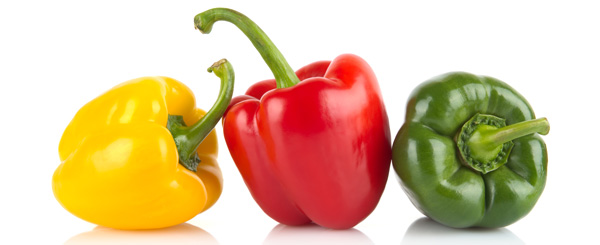 23. Bell Peppers
23. Bell Peppers
Bell peppers of any color are healthy and full of antioxidants and vitamins, but red bell peppers are a particularly outstanding source of Vitamin C. Their crunchy, slightly sweet taste makes them a perfect snack or addition to an omelet or stir fry.
24. Broccoli
Broccoli is a member of the family of vegetables known as cruciferous vegetables. Excellent raw or cooked, it is a great source of Vitamin K, fiber, Vitamin C, and a surprising amount of protein when compared to other vegetables.
25. Carrots
A popular root vegetable, carrots are famous for their sky-high content of beta carotene, which the body converts to Vitamin A.
They are also loaded with Vitamin K, fiber, and other powerful nutrients.
 26. Cauliflower
26. Cauliflower
Cauliflower — also a member of the cruciferous family of vegetables like broccoli — contains fiber, B vitamins, antioxidants, phytonutrients, choline, and a host of other important nutrients.
27. Cucumber
Cucumbers contain a high amount of fiber and water, making them an excellent way to feel full on very few calories. They also contain various nutrients including Vitamin K.
Their satisfying crunch makes a great addition to salads or veggie trays.
28. Garlic
Garlic’s health benefits are as potent as its flavor. It contains allicin, a powerful bioactive compound that may help boost immune system function. Garlic is also a great way to add flavor to recipes without the use of salt or additives.
 29. Kale
29. Kale
Kale has gained notoriety in recent years and it is no surprise when you consider its high content of Vitamin C, Vitamin K, antioxidants, and various other nutrients. It makes a popular addition to salad, smoothies, and of course, is tasty when made into kale chips.
30. Onions
Onions — like garlic — are known for their strong flavor. Just like garlic, onions potent flavor hints at the powerful bioactive compounds it contains.
31. Tomatoes
While often mislabeled as a vegetable, tomatoes are technically a fruit (and quite a healthy one). In addition to being tasty in omelets, soups, and sauces, tomatoes are loaded with beneficial nutrients such as potassium, lycopene, and vitamin C.
 32. Salmon
32. Salmon
With high-quality protein, Omega-3 fatty acids, Vitamin D, and antioxidants such as astaxanthin, salmon is a true superfood.
Numerous studies show that individuals who consume more fish, including salmon, tend to live longer lives and have a lower risk of various diseases.
33. Sardines
Like salmon, sardines are a fatty fish that are brimming with nutrients, vitamins such as Vitamin B12 and Vitamin D, and minerals. They are a convenient, filling snack eaten right out of the can or can be added to salads.
34. Shellfish
Many people are surprised when they find out that shellfish actually rank similar to organ meats when considering nutrients density. Edible shellfish include oysters, mollusks, and clams.
 35. Shrimp
35. Shrimp
Shrimp is low in calories and fat but full of high-quality protein. It is also packed with other vital nutrients such as Vitamin B12 and selenium.
36. Tuna
Tuna, like salmon and sardines, is rich in beneficial Omega 3 fatty acids, high-quality protein, and a wide variety of vitamins and minerals. It is also low in calories and a perfect addition to a healthy diet.
37. Brown Rice
As one of the oldest cereal grains, rice is a staple food for more than half of the world’s population. Brown rice contains nutrients such as Vitamin B1, magnesium, and fiber.
38. Oats
Oats are loaded with beneficial fiber, vitamins, and nutrients, particularly beta-glucans, a form of soluble dietary fiber that is strongly linked to improved cholesterol and heart health.
 39. Quinoa
39. Quinoa
Quinoa has gained popularity in recent years thanks to its enjoyable taste, high content of magnesium and fiber, and an excellent supply of plant-based protein.
40. Ezekiel Bread
While bread isn’t necessarily a health food, it can supply you with a good source of fiber, vitamins, and minerals if you choose the right kind. Ezekiel bread — a sprouted bread packed full of high-quality ingredients — is satisfying, organic, and a great way to enjoy bread while still maintaining a healthy diet.
41. Legumes
Legumes such as green beans, kidney beans, and lentils are brimming with vitamins, minerals, fiber, and plant-based protein. With a particularly satisfying, indulgent texture, legumes are an excellent way to feel full on minimal calories.
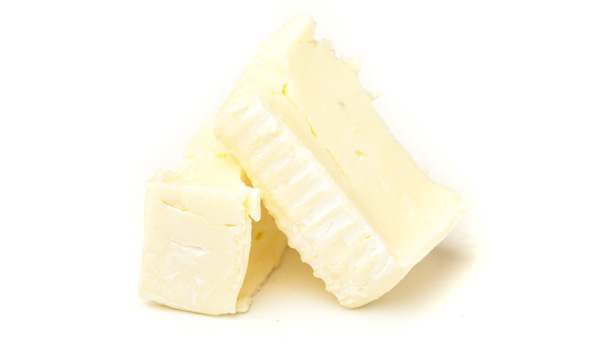 42. Full Fat Cheeses
42. Full Fat Cheeses
While often pegged as an unhealthy food, full-fat cheeses can actually be a beneficial part of a balanced diet. Cheese is actually incredibly nutritious, boasting protein, Vitamin D3, calcium, and other beneficial nutrients.
Full-fat cheese is also more satisfying than its heavily-processed, low or no-fat counterparts. If the dairy comes from grass-fed cows, it may be even healthier since it is higher in bioactive fatty acids such as CLA.
43. Whole Milk
Whole milk contains vitamins, minerals, healthy fats, and quality animal protein. As mentioned with full-fat cheese, dairy from grass-fed cows may be even more beneficial.
44. Yogurt
Made by adding live bacteria to milk and fermenting it, yogurt boasts probiotics. These beneficial, “friendly” bacteria are believed to be helpful for maintaining healthy gut flora and may even support weight loss.
Along with probiotics — which are believed to offer a variety of health benefits in addition to their weight-loss potential — yogurt offers protein, Vitamin D3, and calcium.
 45. Butter
45. Butter
Yes, you read that correctly: butter! Although previously blamed for everything from obesity to heart disease, butter is now recognized as a healthy source of nutrients and healthy fats.
The key is choosing butter from grass-fed cows as this type provides Vitamin K2, an important vitamin necessary for bone health.
46. Coconut Oil
Coconut oil is packed with beneficial fatty acids called medium-chain triglycerides. In addition to being indulgent and satisfying, these fatty acids may even help guard against Alzheimer’s diseaseand aid in losing belly fat.
47. Extra Virgin Olive Oil
Extra virgin olive oil is considered by many as one of the healthiest fats on the planet. Boasting a high content of healthy monounsaturated fats and a dose of antioxidants, olive oil offers excellent flavor and potent health benefits.
 48. Potatoes
48. Potatoes
Although they have faced some scrutiny for their high carbohydrate content, potatoes remain a popular food around the globe. With potassium, a variety of nutrients, and filling fiber, these satisfying tubers are an excellent addition to a variety of meals.
49. Sweet Potatoes
Sweet potatoes are among the most nutritious starchy foods available. They are loaded with fiber, vitamins (including a hefty dose of Vitamin A), minerals, antioxidants and a wide range of healthy nutrients.
50. Apple Cider Vinegar
Apple cider vinegar has seen its popularity soar in recent years. Studies have shown a variety of health benefits from apple cider vinegar including positive effects on weight loss and blood sugar.
It is an excellent addition to homemade salad dressings and an easy way to add a burst of flavor to meals.
 51. Pumpkin Seeds
51. Pumpkin Seeds
These crunchy, satisfying seeds are bursting with healthy fats, fiber, plant-based protein, iron, phosphorous, copper, and manganese.
They are also low in carbs, sugar-free, and make a tasty salad topping or addition to a healthy trail mix.
52. Beets
Beets are low in calories and a great source of nutrients such as filling fiber, potassium, protein, calcium, iron, Vitamin C, and folate. Beets also contain nitrates and pigments that are believed to have beneficial effects on athletic performance and blood pressure.
53. Olives
Olives contain powerful antioxidants — including a high content of Vitamin E — along with iron, copper, and fiber. Studies have demonstrated olives may help protect against cancer and osteoporosis.
Olives are also bursting with healthy fats.
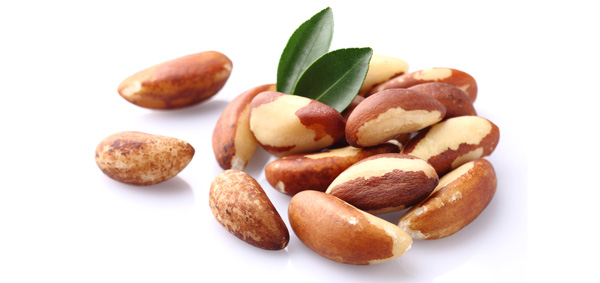 54. Brazil Nuts
54. Brazil Nuts
Brazil nuts are rich in healthy monounsaturated fats, contain a decent amount of plant-based protein, and also boast a variety of nutrients such as Vitamin E, calcium, magnesium, B Vitamins, Vitamin E, and zinc.
Brazil nuts also contain selenium, a powerful antioxidant responsible for a variety of health benefits.
55. Grapes
Grapes are low in calories, naturally sweet, virtually fat-free, and bursting with powerful antioxidants and nutrients.
Among their antioxidants, grapes contain polyphenols, beneficial compounds that are responsible for the vibrant colors of grapes and other plants. Grapes contain a type of polyphenol called resveratrol famous for its anti-inflammatory properties and potential anti-aging properties.
56. Celery
Celery contains a wide range of nutrients including Vitamin K, folate, vitamin A, Vitamin C, and potassium. Consisting mostly of water along with fiber, celery makes an excellent snack if you just need something to crunch on without going overboard on calories.
Celery also contains apigenin, a molecule that is currently being studied for its possible anti-cancer and anti-inflammatory properties.
 57. Spinach
57. Spinach
Spinach is an excellent source of Vitamins A, C, and K, along with being a good source of folate, manganese, magnesium, iron and Vitamin B2.
Its mild flavor makes it perfect as an addition to salads or smoothies.
58. Pomegranate
Pomegranates are rich in vitamin C, potassium, fiber, and antioxidants that help fight free radicals and inflammation.
Specifically, pomegranates contain antioxidants known as polyphenols. These include flavonoids, anthocyanin, and tannins.
59. Mushrooms
Mushrooms — considered by many to be a ‘superfood’ — are low in calories, bursting with nutrients, and an excellent source of fiber and plant-based protein.
They also provide potassium, B vitamins, selenium, and copper. They can even provide a rare source of food-based Vitamin D3 if they have been exposed to sunshine.
Don’t let their white color fool you — they are packed with as many antioxidants as their more colorful fruit and vegetable counterparts.
 60. Mango
60. Mango
Mangoes are low in calories while being high in Vitamin A and C and fiber. They also contain small amounts of Vitamin B6, folate, iron, zinc, Vitamin E, and calcium.
Mangoes are also rich in antioxidants, particularly certain phytochemicals — gallotannins and mangiferin — which have been studied for their potential health benefits.
61. Watermelon
Think watermelon is just water and sugar? No way! While it is over 90 percent water, watermelon is also a nutrient-dense food. It boasts high levels of electrolytes, minerals, vitamins, and antioxidants all while being relatively low in calories.
This iconic summertime food is a refreshing way to stay hydrated on a hot day and also offers a rich source of lycopene
62. Radishes
With just 12 calories and next to zero fat in a 1/2 cup serving, it is hard to believe that radishes pack so much nutrition. Along with providing a good source of Vitamin C, radishes also contain small amounts of:
- Folate
- Riboflavin
- Potassium
- Vitamin B6
- Niacin
- Vitamin K
- Zinc
- Magnesium
- Phosphorous
- Copper
- Manganese
 63. Zucchini
63. Zucchini
Zucchinis contain significant amounts of Vitamin C, K, and B6, riboflavin, folate, antioxidants, phytonutrients, and important minerals such as potassium and manganese.
Zucchinis also contain a high content of water along with fiber and electrolytes.
64. Grapefruit
Grapefruit offers a range of health benefits thanks to its high levels of Vitamin C, nutrients, Vitamin A, and nutrients. They are known for their ability to help support clear, healthy skin and weight loss efforts.
The juices, peels, and pulp of grapefruit all have nutritional benefits.
65. Dark Chocolate
The list of the planet’s healthiest foods would not be complete without chocolate! Believe it or not, dark chocolate is bursting with proven health benefits.
Sourced from the cocoa bean, this delectable treat is bursting with potent antioxidants and also includes fiber, zinc, iron, and magnesium. Typically, the darker the chocolate, the healthier it is.
Final Thoughts
We hope our list of the 65 healthiest foods on the planet helps motivate you to add some new foods into your meal and snack rotation.
As you can see, each food offers its own unique benefits, making it important to include a wide variety of choices as part of a balanced diet.
Are any of your favorites on this list? What healthy foods did we miss? Let us know in the comments! As always, we enjoy hearing your feedback.
